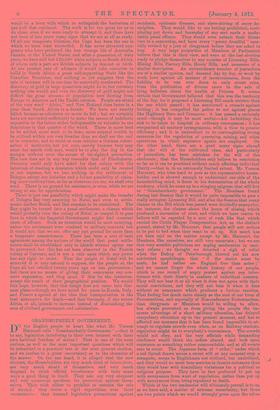THE GERMANS IN SOUTH AFRICA.
IF the statement made by the Telegraph on Tuesday about Delagoa Bay is true, the German Chancellor has made another hit, and Lord Kimberley will have business on his hands of a very important kind. The statement is that the German Government either have purchased or are about to purchase the Po-rtuguese settlements in Delagoa Bay, which would give them the sovereignty over any regions in that corner of Southern Africa not already in the possession of European Powers, and there are several prima facie reasons for believing the report. The Germans, in the first place, would like a colony within a semi-tropical climate very mach indeed. The Parliament of Berlin has repeatedly expressed a desire for one, and the Emperor himself is believed to be strongly moved by the vast loss which, as he considers, Ger- many sustains by the annual emigration to America, a move- ment which he vainly attempts to check by raising the railway fares and decreeing loss of status to all who avoid military duty. If he could divert this emigration to a colony of his own, it would seem to him less burdensome, more especially as colonies, in the opinion of all Continental statesmen, bring with them ships and commerce to the mother country. The selection of Delagoa Bay as the point of settlement, on the other hand, is probably due to three considerations. One is that the harbour is a splendid one, and situated almost pre- cisely in the middle of the ordinary route for sailing ships bound to China and the far East, a part of the globe in which many Germans think they have reversionary interests. A second is that behind the Bay lies a vast stretch of habitable country, in which colonisation might go on to an almost indefinite extent ; and a third, and Most important of all, is that the Bay is a natural point of entrance from the outside world to the territories claimed by the Boer or Free Dutch States. These States have repeatedly expressed an inclination to seek support in Europe, and two years ago despatched agents or envoys to make inquiries both at the Hague and in Berlin,—inquiries which were noted at the time by the Colonial Office. Our quarrel with them about the diamond-fields, which they claimed as conquerors of the Basntos, did not diminish this readiness, which may have resulted in formal offers of allegiance to the German Emperor. If these have been made, and have been favourably regarded, then the possession of Delagoa Bay gives the German Govern- ment an immense and fertile territory, partly peopled already by men who know it well ; who can, with a little assistance, defend it against all native assaults, and who accept the new dominion with willing and unforced submission. From the Bay down to Natal, to the North as far as he pleases, and to the West as far as he can penetrate, Frederick William may be lord of a splendid domain, at least as large as England, in which white men can work, and plant, and develope, as the Dutch settlers have done, all the physical qualities of Kentuckians. Where Dutchmen have thriven, Germans can thrive. There is no bigger, or braver, or, if Colonial despatches may be trusted, more cruel man on earth than the free Dutch settler of South Africa, who, if this report is correct, will be shortly in correspondence with our Government of the Cape in the new character of subject of the great German Empire. As the native is pretty certain to try to play off the new Govern- ment against our own, as the Boer is savage at English interference with his slaves, and English claims to " his " diamond-fields, and as the German wherever he is struggles hard for all he deems his right, it will be well if our Colonial Office is awake, if boundaries are made pretty distinct, and if we devise for the two Colonial Govern- ments some policy on which they may dwell side by side in peace. We should fight bard for Canada, but we do not want two Canadas on our hands, or the chance of having to resist forays in which German troops took part, and in which the sympathies of our own subjects might by possibility be divided. It is one thing to govern South Africa when we are alone on the continent, and quite another thing to let it govern itself when on its remotest frontier stands a jealous, exacting, and extremely powerful European State.
The Colonial Office will not like its new task or this conse- quence of its silent annexations, but there is, if Delagoa Bay has been sold, no means of avoiding a movement which, how- ever inconvenient to ourselves, is distinctly beneficial to the world. If the Germans have the courage and the capacity and the numbers to colonise South-Eastern Africa on any great scale, their enterprise is one to be welcomed by every lover of humanity. They will but take their proper place in the colonisation, as they have long assumed it in the investiga- tion of the world. Their people make splendid colonists every- where, and have a full right to try if they cannot establish a colony for themselves, a country whither their surplus numbers may resort, carrying with them the special civilisation, the language, the manners, and perhaps the political organisa- tion of the Fatherland. A German nation in South Africa would be a lever wi.th which to extinguish the barbarism of one-half that continent. The work is far too great for us to do alone, even if we were ready to attempt it, and there have not been of late years many signs that we are at all so ready. Of all our temperate Colonies, the Cape has been the one in which we have least succeeded. It has never attracted emi- grants who have preferred the less strange life of Australia, Canada, or the United States, and after a possession of sixty years, we have still but 120,000 white subjects in South Africa, of whom only a part are British subjects by descent or birth. At our present rate of advance, it would take centuries to build in South Africa a great self-supporting State like the Canadian Dominion, and nothing as yet suggests that the rate of increase will in our time be materially accelerated. The discovery of gold in large quantities might do it, but certainly nothing else would, and even the discovery of gold might not deflect the great streams of population now flowing from Europe to America and the Pacific colonies. People are afraid of the very word "Africa," and New Zealand rises faster in a year than South Africa in a decade. We have not exactly failed, because an colonisers we never do fail ; but we certainly have not succeeded sufficiently to make the means of indefinite expansion in the future either indispensable or valuable to our dominions in that quarter of the world. There is more land to be settled, more work to be done, more mineral wealth to be utilised within our own frontier than we shall see the end of in centuries, and to resist or even criticise a German coloni- sation of territories not yet ours, merely because they may some day march with ours, would be to play the dog in the manger without even the excuse of far-sighted precaution. The case does not in any way resemble that of Pondicherry. Germany could only have asked for that colony with the intention of creating a dominion which could only be created at our expense, but we lose nothing in the settlement of Delagoa except our isolation and a future possibility of claim- ing more territory than, as far as observers can see, we shall ever need. There is no ground for resistance, or even, while we are strong at sea, for apprehension.
There is just one possibility which might make the transfer of Delagoa Bay very annoying to Natal, and even to settle- ments farther South, and this remains to be considered. The Bay might be turned into a penal settlement, a change which would probably ruin the colony of Natal, or compel it to pass laws in which the Imperial Government might find constant cause of offence. Such an intention would be most annoying, unless the settlement were confined to military convicts, but it would not, that we see, offer any just ground for more than a' temperate remonstrance. There has been a sort of tacit agreement among the nations of the world that penal settle- ments shall be established only in islands whence egress can be prevented, but this has not been observed in the French colony of Cayenne, and is not a rule upon which any power has any right to insist. That the people of Natal will be annoyed it is only natural to suppose, for the people at the Cape all bat rebelled twenty years ago on less provocation ; but there are no means of giving their annoyance any con- crete expression, and the/ mast, if this be the intention, accept the result of their geographical position. We would fain hope, however, that this design does not enter into Ger- man plans—though we have noted for years in Russia, Italy, and France a spread of the idea that transportation is the best alternative for death—and that Germany, if she enters Africa at all, intends to increase instead of diminishing the area of civilised government and colonisation.











































 Previous page
Previous page